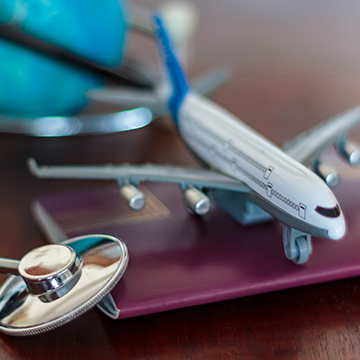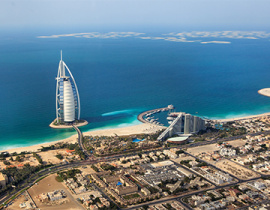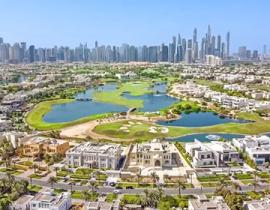- Home
- Blog
- Tips & Advice
- What You Need to Know Before Moving to the UAE as an Expat
What You Need to Know Before Moving to the UAE as an Expat
Moving to the UAE is a big change that takes careful planning to make sure you settle in well. You will need to understand the visa system, know the cost of living, and decide which emirate best fits your lifestyle and goals. Your choices in healthcare, education, and transportation will also shape your daily routine. Each decision you make before relocating to the UAE affects your long-term plans in the country. By exploring these topics in detail, you can make informed choices that help you start your new life.
Types of UAE Residency Visas and Sponsorship
 Before moving to the country, you need to understand the key differences in residency visas for expats in UAE. For anyone moving house to UAE, this starts with choosing the right visa type. You can apply for a Standard Work Visa, a Green Visa, a Golden Visa, or a Domestic Worker Visa. Each has its own validity, sponsorship type, and eligibility rules.
Before moving to the country, you need to understand the key differences in residency visas for expats in UAE. For anyone moving house to UAE, this starts with choosing the right visa type. You can apply for a Standard Work Visa, a Green Visa, a Golden Visa, or a Domestic Worker Visa. Each has its own validity, sponsorship type, and eligibility rules.
A Standard Work Visa is tied to an employer and lasts two years, while Green and Golden Visas allow self-sponsorship for five to ten years based on skills, income, or investment. Domestic Worker Visas require an employer or household sponsor. Knowing which visa fits your situation helps you plan your stay and avoid costly delays, especially for HNWIs moving to the UAE who often look for long-term residency.
Work visa requirements change depending on your profession and skill level, so those considering international moving to UAE should review them early. The Ministry of Human Resources and Emiratisation classifies jobs into three skill levels with matching education and salary conditions. A doctor or engineer needs a bachelor’s degree or higher, while technicians or sales executives can qualify with a diploma. Drivers or cleaners require a high school certificate. Some professions like healthcare or engineering also need UAE-recognized licenses. Freelancers applying for a Green Visa must show steady income or financial solvency, and digital nomads need proof of overseas work and a qualifying salary. These rules help the UAE match workers to industry needs and reduce common mistakes to avoid when moving to the UAE.
The Emirates ID is one of the most important documents you will carry in the United Arab Emirates. You need it for almost every official or personal transaction. The card links you to healthcare, banking, education, and government services, and it even allows faster travel through e-gates. To get one, you first secure your residence permit, then apply, provide your biometrics, and collect the card from the post office. Without it, you cannot register a car, get a driver’s license, or even sign a telecom contract. It becomes part of your daily routine in the country, especially for expats in UAE settling into local systems.
Sponsorship rules decide who is responsible for your visa and how much freedom you have. Employer-sponsored visas mean your company applies and pays for the process, but you are tied to that job. Self-sponsored visas like the Green and Golden types let you work for yourself or invest, and you can also sponsor your immediate family. This gives you more independence because you are not dependent on a single employer. Understanding these options before applying helps you choose the right path for your work and life in the UAE and can even influence which of the top expat-friendly cities in the UAE will best match your goals.
Cost of Living in the UAE
Understanding the cost of moving to UAE early on can help you prepare for both one-time and ongoing expenses. Housing is usually the largest cost for anyone living in the UAE as an expat, and prices vary greatly between Dubai, Abu Dhabi, and Sharjah. Healthcare can be affordable with a basic plan, but private coverage can be much higher. Daily expenses like food, utilities, and transport can quickly add up, especially in Dubai, because of the high standards of living. Education for children can be a major cost, and there are also smaller but frequent expenses such as remittance fees and deposits. By understanding these differences, you can set a budget that supports your lifestyle and goals while enjoying the benefits of expat life in UAE.
| Category | Average Cost (AED) | Typical Range (AED) |
| Restaurants | 53 (average meal across types) | 1–500 |
| Markets (Groceries) | 15 (average item cost) | 1–100 |
| Transportation | 31 (average fare/fuel per use) | 1.82–166,827 |
| Utilities (Monthly) | 419 | 90–1,275 |
| Sports & Leisure | 148 | 40–500 |
| Childcare & Education | 24,173 | 1,200–75,000 |
| Clothing & Shoes | 315 | 80–700 |
| Rent (Monthly) | 7,460 | 2,343–25,000 |
| Apartment Purchase Price (per m²) | 18,536 | 8,144–32,291 |
| Average Monthly Net Salary | 11,363 | — |
| Mortgage Interest Rate (20-year fixed) | 4.65% | 3.5–6.5% |
Choosing the Best Emirate to Live and Work in the UAE
 Dubai, Abu Dhabi, Sharjah, and Ras Al Khaimah each offer a different pace and style of life for expat living in UAE. Dubai moves fast and attracts many looking for the best investment in UAE for expats because of its diverse industries, competitive job market, and luxury lifestyle. Abu Dhabi offers steady government, oil, and healthcare roles, plus strong salaries and expanding green energy projects, which appeal to those considering buying property in UAE for expats. Sharjah and RAK have smaller markets and lower costs, ideal for teachers, logistics workers, and hospitality staff. Choosing the right emirate depends on your priorities, whether career variety, income stability, or affordability.
Dubai, Abu Dhabi, Sharjah, and Ras Al Khaimah each offer a different pace and style of life for expat living in UAE. Dubai moves fast and attracts many looking for the best investment in UAE for expats because of its diverse industries, competitive job market, and luxury lifestyle. Abu Dhabi offers steady government, oil, and healthcare roles, plus strong salaries and expanding green energy projects, which appeal to those considering buying property in UAE for expats. Sharjah and RAK have smaller markets and lower costs, ideal for teachers, logistics workers, and hospitality staff. Choosing the right emirate depends on your priorities, whether career variety, income stability, or affordability.
Work opportunities also vary greatly between emirates. Dubai leads in tech, finance, and media roles, drawing professionals worldwide. Abu Dhabi focuses on energy, healthcare, and government jobs, offering long-term stability and benefits. Sharjah is growing its free zones with openings in education, logistics, and manufacturing. RAK suits mid-career professionals or those seeking a quieter work environment in resort tourism and light industry. This diversity makes the UAE appealing for expats who need expat health insurance UAE providers to support their well-being.
Community culture shapes daily life for expats, and each emirate offers different options. Dubai and Abu Dhabi have large, active expat networks with frequent social and professional events that help you settle in. Sharjah focuses on cultural heritage and family-friendly activities, attracting long-term residents. RAK provides smaller, close-knit communities, especially popular among remote workers. Recreational choices vary, too: Dubai has beaches, desert safaris, and nightlife; Abu Dhabi offers cultural landmarks and entertainment hubs; Sharjah is known for museums and arts festivals; and RAK features outdoor adventures and beachfront dining. You can even bring your pet to Dubai, adding another layer of comfort to expat life in UAE.
Healthcare, Education and Transportation for Expats in the UAE
.jpg) The percentage of expats in UAE is high, making the expat visa UAE system a crucial part of daily life for many residents. Healthcare in UAE for expats offers two main paths: public and private. Public hospitals provide high-quality care but focus mainly on Emiratis, so expats often face longer waits and limited language support. For this reason, most expats rely on health insurance for expats in UAE to access private healthcare, which delivers faster service, modern facilities, and internationally accredited hospitals. Visits to private clinics generally cost less than in many Western countries, though insurance premiums should be factored into your budget.
The percentage of expats in UAE is high, making the expat visa UAE system a crucial part of daily life for many residents. Healthcare in UAE for expats offers two main paths: public and private. Public hospitals provide high-quality care but focus mainly on Emiratis, so expats often face longer waits and limited language support. For this reason, most expats rely on health insurance for expats in UAE to access private healthcare, which delivers faster service, modern facilities, and internationally accredited hospitals. Visits to private clinics generally cost less than in many Western countries, though insurance premiums should be factored into your budget.
Education in the UAE varies, with free education in UAE for expats being rare, so families usually choose from British, American, International Baccalaureate, or Indian curricula. British schools are the most widespread and highly rated, while French or German options are less common. The KHDA monitors school quality with ratings from “Weak” to “Outstanding,” helping parents select the right system for their child’s academic goals.
Transportation is also flexible and convenient. In Dubai, metros, buses, and trams connect key districts with a unified Nol card system, making travel affordable. Taxis operate 24/7, perfect for short trips or places not served by public transport. Driving is possible after converting some foreign licenses or passing local tests. Owning a car offers freedom, but many expats find public transport reliable for avoiding traffic and parking challenges.
Understanding jobs, visas, and work culture in the UAE helps expats settle smoothly in this dynamic country.










